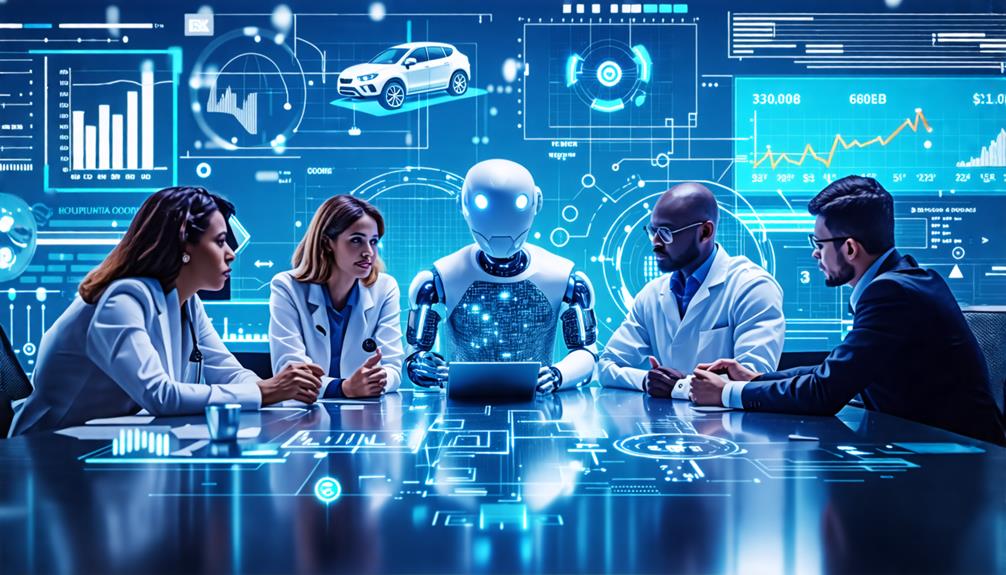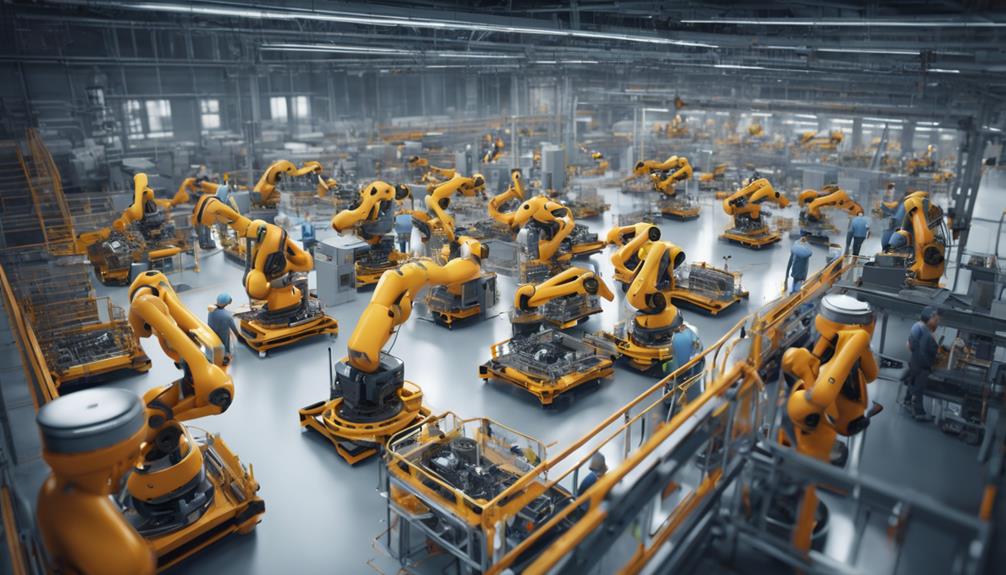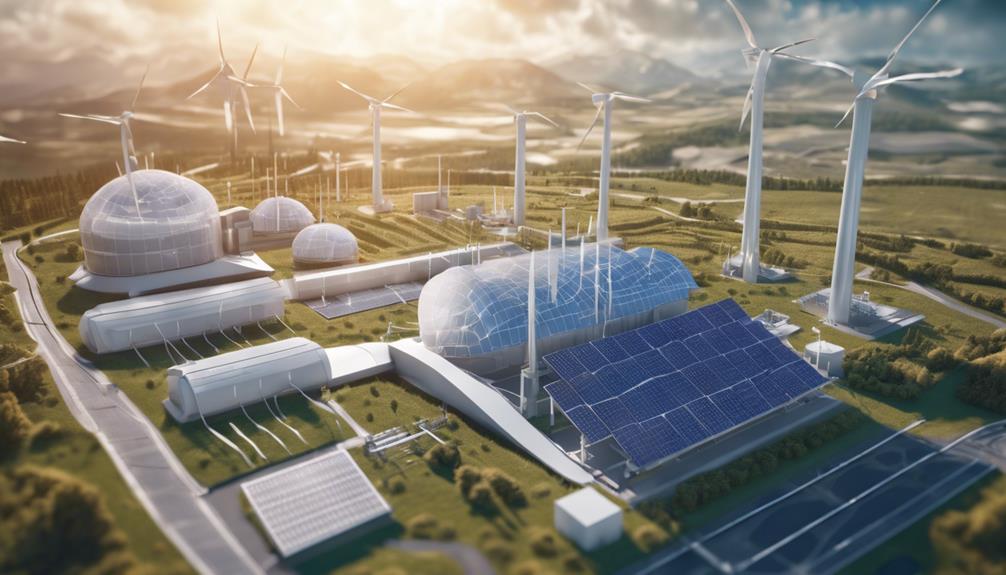
You'll find that companies like Google and Amazon, deeply invested in AI, are benefiting enormously. Their uses range from refining search algorithms to personalizing your shopping experience. Similarly, healthcare and biotechnology firms are rapidly advancing with AI-powered solutions that speed up disease diagnosis and drug discovery, tailoring medical treatments to your unique genetic makeup. Moreover, financial services leverage AI to enhance operational efficiency and personalize banking experiences. The implications extend to manufacturing and energy sectors, where AI optimizes production and energy use. These insights suggest a broader horizon awaits, offering you a deeper understanding of AI's diverse applications across industries.
Tech Giants and Startups

Tech giants and startups are rapidly harnessing AI to innovate and gain a competitive edge. You'll find that companies like Google and Amazon are investing heavily in AI to refine search algorithms and personalize shopping experiences. Meanwhile, smaller tech startups aren't just playing catch-up; they're also pioneering unique applications that disrupt traditional markets.
For instance, AI-driven analytics tools are helping businesses predict consumer behavior with stunning accuracy. You're seeing companies leverage machine learning to optimize everything from inventory management to marketing strategies. This isn't just about improving efficiency; it's about creating a more engaging, customized user experience that keeps customers coming back.
Moreover, AI is revolutionizing customer service. Chatbots and virtual assistants, powered by sophisticated AI, are handling inquiries and solving problems around the clock. You've likely interacted with these technologies without even realizing it. They're so seamlessly integrated into websites and apps that they feel like a natural extension of the team.
In the realm of cybersecurity, AI is a game changer. Startups are developing intelligent systems that can predict and neutralize threats before they become significant issues. This proactive approach isn't just saving companies from potential disasters; it's also building trust with users, enhancing their confidence in digital platforms.
Healthcare and Biotechnology
In healthcare and biotechnology, AI is transforming how we diagnose diseases and develop new treatments. You'll see companies leveraging AI to sift through enormous datasets, identifying patterns that humans might miss. This isn't just about faster results; it's about more accurate, personalized medical insights that can fundamentally change patient outcomes.
Imagine you're dealing with a rare disease. Traditional research methods might take years to yield a viable treatment. However, AI-driven companies can accelerate this process, analyzing genetic information and medical records at unprecedented speeds. They're not only finding treatments faster but also tailoring them to individual genetic profiles, enhancing effectiveness and reducing side effects.
Moreover, AI is revolutionizing drug discovery. By predicting how different chemicals will interact, AI saves time and resources in developing new drugs. This isn't a small feat; it's a game-changer that reduces the billion-dollar costs associated with pharmaceutical research.
Additionally, AI tools are being deployed to improve healthcare delivery. They help manage and analyze continuous data streams from medical devices, enabling real-time monitoring and early warning systems for conditions that need immediate attention. This level of surveillance ensures that you receive timely, perhaps even life-saving interventions.
Financial Services and Banking

AI is also reshaping the landscape of financial services and banking, streamlining operations and enhancing customer experiences. When you interact with your bank today, chances are you're experiencing AI firsthand. It's behind the chatbots that handle your queries swiftly or the smart algorithms that detect fraud before it affects your account.
You'll see AI's impact when you apply for a loan. Gone are the days of waiting weeks for approval. AI analyzes your application, checks your creditworthiness, and makes decisions in near real-time. This not only speeds up the process but also decreases the chance of human error.
AI is transforming investment strategies as well. Robo-advisors, powered by AI, provide personalized investment advice based on your financial goals and risk tolerance. They're more accessible than traditional financial advisors, often requiring lower minimum investments and charging lower fees.
Moreover, AI helps banks manage risk more effectively. By predicting market trends and customer behavior, banks can better mitigate risks associated with loans and investments.
As a customer, you benefit from more secure, efficient, and personalized banking services. AI is making financial systems more reliable and user-friendly, ensuring that your financial needs are met with precision and care.
Retail and E-Commerce
As you shop online, AI tailors your browsing experience, suggesting products based on your past purchases and search behaviors. This personalization isn't just convenient for you—it's a goldmine for retailers. By analyzing vast amounts of data, AI predicts what you're most likely to buy next, leading to targeted advertisements and tailored email campaigns that are significantly more effective than traditional methods.
Beyond marketing, AI streamlines inventory management in real-time. It anticipates demand trends, helping stores optimize their stock levels, reducing both overstock and stockouts. This efficiency not only cuts costs but also boosts customer satisfaction by ensuring popular items aren't sold out.
Moreover, AI enhances customer service by powering chatbots that provide instant responses to your inquiries. These bots are learning from each interaction, constantly improving their ability to resolve issues quickly and accurately. This means less waiting for you and reduced operational costs for the retailers.
In this rapidly evolving retail landscape, companies that integrate AI effectively are poised to outperform their competitors. They're not only enhancing your shopping experience but are also operating more efficiently and responsively.
As AI technology advances, its role in e-commerce is set to grow, reshaping the future of how businesses connect with and serve you.
Manufacturing and Automation

You've seen how AI revolutionizes retail; now, let's explore its impact on manufacturing and automation. AI's integration into these sectors isn't just changing how things are made but also enhancing the speed and quality of production.
Imagine factories where AI-driven robots operate alongside humans, not only performing repetitive tasks but also adapting to new processes quickly and efficiently. This isn't the future; it's what's happening right now.
For you, as a business owner or industry leader, this means lower costs and higher throughput. AI optimizes production lines, minimizing downtime and predicting maintenance issues before they become critical. This proactive approach saves millions and prevents delays. Moreover, quality control has shifted gears.
AI algorithms analyze products in real-time, detecting defects that human eyes might miss. The result? A significantly lower rate of errors and a boost in customer satisfaction.
And it doesn't stop there. AI is transforming how products are designed. It enables simulation of thousands of prototypes, iterating designs with a speed unmatchable by human teams. This not only cuts down the time to market but also ensures that the final product is as close to perfection as possible.
For companies in manufacturing and automation, AI isn't just an option; it's a necessity to stay competitive.
Transportation and Logistics
Shifting focus to transportation and logistics, AI is revolutionizing how goods are moved and managed across the globe. You'll see its impact clearly in the efficiency of routing and delivery systems. AI optimizes routes in real-time, considering traffic, weather, and vehicle conditions, which means you're less likely to face unexpected delays in shipments. This isn't just about speeding things up; it's about making them more reliable and predictable.
AI also plays a crucial role in inventory management. You can now track and predict stock levels with far greater accuracy, reducing the risk of overstocking or shortages. This precision helps in maintaining a lean inventory, which cuts down costs and increases your operational efficiency.
Moreover, the integration of AI in customer service within the logistics sector offers you insights into customer behaviors and preferences, enabling more personalized service delivery. This doesn't just boost customer satisfaction; it also cultivates loyalty, giving companies a competitive edge.
For you, as a stakeholder in this industry, embracing AI technologies isn't just an option; it's essential. It's not just about keeping up—it's about staying ahead. In an increasingly competitive and global market, AI's role in streamlining operations can't be overstated.
Energy and Utilities

How is AI transforming the energy and utilities sector?
You mightn't realize it, but AI is revolutionizing the way energy companies operate, making systems more efficient and reliable. It's optimizing grid operations and energy usage to ensure you get electricity that's not only consistent but also affordable. AI algorithms predict peak times and adjust flows to avoid outages. This means fewer interruptions in your day-to-day life.
AI's also at the forefront of renewable energy.
It's helping companies predict weather patterns more accurately, which enhances the efficiency of wind and solar power generation. You'll see more stability in energy supply, even with resources that are inherently unpredictable. This is crucial as the world shifts towards sustainable energy sources.
Additionally, AI is improving the maintenance of infrastructure.
It predicts when equipment needs repair, which prevents failures that could disrupt your service. This proactive approach saves companies significant money, and these savings can be passed on to you as lower prices.
Education and Research
AI is revolutionizing education and research by personalizing learning experiences and streamlining data analysis. You'll see companies in this space, like Coursera and Khan Academy, harness AI to tailor courses to your pace and learning style. They're using algorithms that adjust content based on your interaction patterns, making learning more effective.
In research, AI is a game changer. Firms such as IBM and Google are investing heavily in AI to speed up data processing and enhance predictive models. This not only accelerates the pace of discovery but also reduces the time you spend on data-intensive tasks. Imagine AI tools that can predict trends from vast data sets in seconds, which previously took days or weeks.
Moreover, educational institutions are partnering with AI-driven tech companies to transform their curricula. For instance, universities are collaborating with AI startups to integrate real-time AI tools into their courses, preparing you for an AI-driven workplace.
These advancements mean companies like yours can benefit significantly from AI in education and research sectors. By adopting AI, you're not just staying ahead technologically but also enhancing your strategic capabilities, making your operations more efficient and forward-thinking.
Frequently Asked Questions
How Will AI Impact Job Security in Traditional Industries?
AI might threaten your job security in traditional industries by automating routine tasks. You'll need to adapt and possibly retrain to stay competitive as some roles become obsolete and new opportunities arise.
Can AI Improve Global Environmental Sustainability?
You're wondering if AI can boost global environmental sustainability. Yes, it can by optimizing resource use, reducing waste, and enhancing energy efficiency. These improvements significantly contribute to a more sustainable environment worldwide.
What Are the Ethical Concerns Surrounding AI Deployment?
You're considering AI's ethical concerns, such as privacy invasion, bias propagation, and job displacement. It's crucial to address these issues to ensure AI's benefits don't overshadow its potential harm to society.
How Does AI Influence Consumer Privacy and Data Protection?
AI can erode your privacy by collecting and analyzing vast amounts of your data, often without clear consent. It's crucial to understand and control how your information is used and protected.
What AI Regulations Are Governments Considering?
You're probably wondering about AI regulations considered by governments. They're debating transparency, accountability, and data security laws to ensure tech advancements don't compromise privacy or lead to unethical uses of artificial intelligence.
Conclusion
You're on the brink of witnessing a transformative era as AI reshapes multiple industries. Whether you're involved in healthcare, finance, or retail, you'll see benefits like enhanced efficiency and innovation.
Companies in manufacturing and logistics are streamlining operations, while those in education and energy are discovering groundbreaking solutions. As AI continues to evolve, stay alert to the opportunities it brings.
It's not just about keeping up; it's about leading the way in this exciting technological landscape.






